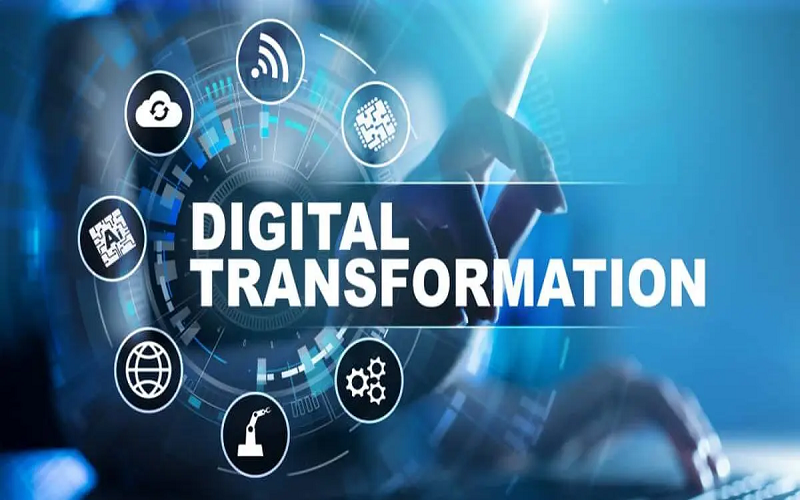To thrive in the modern business environment, companies must maintain a competitive edge. Critical to this endeavour is SAP ERP transformation, which drives innovation, optimizes operations, enhances customer experiences, and boosts profitability. SAP ERP systems are sophisticated software solutions designed to integrate and manage core business processes. By leveraging SAP ERP transformation, organizations, achieve significant advancements and improved operational efficiency.
The Need For Innovation To Thrive In Today’s ConstantlyEvolving Business Environment
Today’s business environment is marked by unprecedented technological advancements, evolving consumer expectations, and fierce competition. Organizations that neglect to innovate, often face the threat of becoming outdated, whereas those that embrace change establish themselves as frontrunners within their sectors.
A primary impetus for the necessity of innovation is the constant technological advancements. The advent of artificial intelligence (AI), machine learning (ML), blockchain technology, and the Internet of Things (IoT) has fundamentally transformed business operations. Enterprises are harnessing these technologies to optimize processes, enhance customer interactions, and develop novel value propositions. For example, AI-driven chatbots are revolutionizing customer service by offering immediate support and customized interactions at all hours. Similarly, blockchain technology is being employed to improve transparency and security in supply chain management.
Another pivotal element driving businesses towards innovation is consumer behaviour. Consumer expectations are evolving rapidly. Today, customers are more informed and demand higher standards than ever before. They seek products and services that offer convenience, personalization, and value for money. Consequently, businesses must innovate to meet these expectations or risk losing their market share to more agile competitors. For instance, the rise of fintech start-ups has disrupted traditional banking by providing faster and more convenient financial services through mobile applications.
Furthermore, globalization necessitates innovation as companies now compete on a global stage with significantly reduced entry barriers. Only the most innovative companies can differentiate themselves and capture substantial market share. The automotive industry exemplifies this trend, with electric vehicle manufacturers such as Tesla challenging established car makers globally. Moreover, innovation enhances efficiency and cost-effectiveness, providing competitive advantages through the adoption of new technologies and processes.
How SAP ERP Transformation Drives Innovation:
Standardization of Processes:
The SAP ERP system facilitates the standardization of business processes organization-wide, thereby liberating resources and diminishing the time dedicated to routine tasks, which allows for an increased focus on innovation.
Real-Time Data Access:
This system provides access to real-time data, which is essential for recognizing trends, making well-informed decisions, and cultivating a culture of continuous improvement and innovation.
Enhanced Collaboration:
Through the integration of various business functions, the SAP ERP system promotes inter-departmental collaboration, leading to innovative solutions for complex challenges.
Improved Agility:
By streamlining operations, businesses can more swiftly adapt to market changes, customer requirements, and emerging opportunities, thus fostering an agile and innovative approach to business.
Support for New Business Models:
The flexibility of the SAP ERP system facilitates the development of novel business models, such as subscription services or mobile commerce, potentially generating innovative revenue streams.
Advanced Analytics:
The advanced analytics capabilities of the system enable trend prediction and outcome modelling, driving innovation in product development, customer experience enhancement, and operational efficiency improvement.
Technology Integration:
The SAP ERP system can integrate with cutting-edge technologies like IoT, AI, and machine learning, enabling businesses to explore innovative applications of these technologies within their processes and offerings.
Globalization:
By facilitating operations across borders with multi-language and multi-currency support, the SAP ERP system bolsters global business strategies, unlocking innovative growth and expansion opportunities.
Future Trends In SAP ERP And Innovation
Advancements in technology have profoundly impacted the domain of enterprise resource planning (ERP), with SAP ERP consistently positioned at the vanguard of this progression. As enterprises endeavour to remain competitive and adaptable in a perpetually evolving market, comprehending future trends in SAP ERP and innovation becomes indispensable.
Some of the key trends include:
Cloud Computing:
SAP is progressively advancing towards cloud-based solutions via SAP S/4HANA Cloud. This transition enables enterprises to capitalize on the scalability, flexibility, and cost-efficiency offered by cloud services.
Artificial Intelligence and Machine Learning:
Integrating AI and ML into SAP ERP systems facilitates predictive analytics, intelligent automation, and improved decision-making processes.
Internet of Things (IoT):
The incorporation of IoT with SAP ERP permits real-time data acquisition from a plethora of devices and sensors, enabling proactive maintenance, optimization of the supply chain, and the development of new business models.
User Experience (UX) Enhancements:
Commitment to enhancing the user experience through SAP Fiori, which simplifies the user interface, rendering it more intuitive and accessible.
Advanced Analytics:
Delivering deeper insights into business operations via robust analytics tools that support superior strategic decision-making.
Blockchain Integration:
Exploring the integration of blockchain technology within SAP ERP to ensure secure, transparent, and efficient transactions and data tracking.
Sustainability:
With an increasing focus on sustainability, SAP ERP is anticipated to incorporate additional features that assist businesses in reducing their carbon footprint and managing environmental compliance.
Robotic Process Automation (RPA):
Streamlining repetitive and manual tasks through RPA to augment efficiency and permit employees to concentrate on higher-value work.
Hybrid Landscapes:
Merging on-premises and cloud solutions to create hybrid landscapes that combine flexibility and customization while benefiting from cloud advantages.
Mobile Accessibility:
Enhancing mobile access to SAP ERP systems permits greater flexibility and facilitates management for a mobile workforce.
Summary:
In today’s business milieu, marked by unparalleled technological strides, evolving consumer demands, and fierce competition, innovation is vital for enterprises. Failure to innovate risks obsolescence, whereas those who embrace change ascend as industry leaders. Technologies such as AI, blockchain, and IoT are revolutionizing operations, optimizing processes, and enhancing customer interactions.
SAP ERP transformation aids companies by standardizing processes, providing real-time data access, enhancing collaboration, improving agility, supporting new business models, offering advanced analytics, integrating new technologies, and facilitating globalization.










